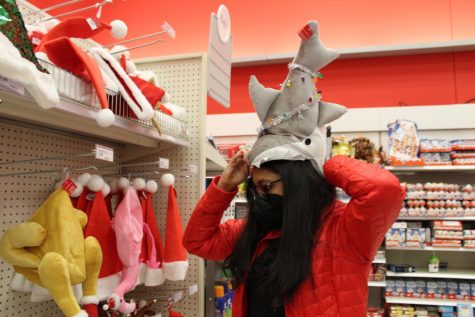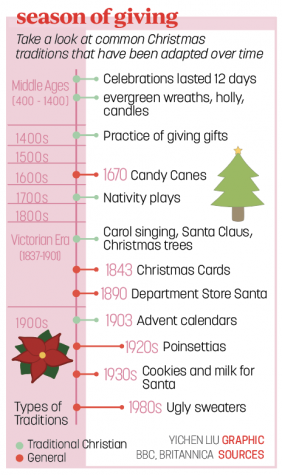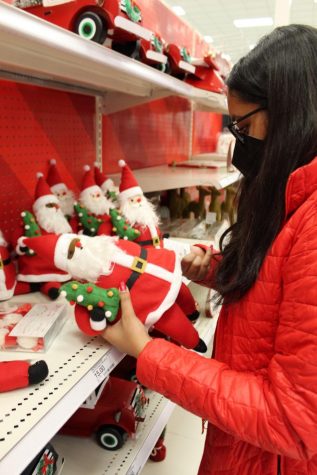For sophomore Vaishu Majji, Christmas can be a unique way to spend time with family.

Christmas is a Christian holiday which commemorates the birth of Jesus Christ. It is also statistically one of the most popular national holidays in the United States. However, despite its Christian roots, many non-Christian families, like Majji’s, choose to celebrate it.
Majji, a Hindu, said certain societal factors drove her family to begin engaging in the holiday.
“My family didn’t celebrate Christmas until I was born,” she said, “so I guess they just wanted to give me that ‘American experience.’

“I feel like a lot of people in America honestly celebrate it like a secular holiday; it’s kind of become one of those holidays that a lot of people celebrate here,” she added. “I feel like ours is different because we don’t really associate any (religion)—we don’t have that kind of religious affiliation—like I don’t really know what Christian people do at Christmas, but from what I’ve heard from my friends, the day starts out maybe getting presents and going to church—something we don’t do—I don’t—it’s a little bit the same. I see a lot of people with decorations of Mary and Baby Jesus and we don’t really have that. We have Santa.”
Freshman Ethan Wu, who identifies as non-religious, said he has celebrated Christmas with his family since he was about 5 years old.
“I think it was just because they saw Christmas all around America, so they just adopted it, too,” he said.
Like Majji, Wu said he also celebrates Christmas secularly, unlike Christians. He said he feels the way Christians celebrate Christmas is more religious, mentioning Jesus, whereas the way he celebrates is more centered on gift-giving, so he said his experience is more casual that way.
Majji said she is one of the people who participates in the holiday with an absence of its religious background. She said, “I kind of celebrate Christmas as a secular holiday—like the giving of gifts, spending time with family, so we don’t really affiliate anything religious with it. But yeah, a lot of it is time with family, eating good food, and a lot of lights and presents.”

Director of Orchestras Thomas Chen, who is also non-religious, said over time, his family’s celebrations morphed and changed.
“When I was younger, we set up a tree, decorated the house, and put out lights all as a family,” he said via email. “On Christmas Day, we give gifts and prep for a big dinner.
“One of the biggest changes that we’ve made to our celebrations has been dinner,” he said. “We used to spend a lot of time preparing a large American-style dinner with some of our favorite Chinese dishes. Now, we do hot pot. It’s way easier, and I like how it keeps us at the table to talk to each other for longer than a traditional meal. Our Chinese culture has impacted the food that we eat the most.”
Majji also said she focuses on the family aspect of Christmas celebrations. She said that nearly every year, “Usually all of our family who lives in America, we’d all meet up somewhere at someone’s house: last year, we spent it in Ohio. We’d usually get up in the morning, all the kids would open presents, and I guess we’d all kind of sit as a family—sometimes we’d play Christmas games—and usually in the evening we’d go downtown.”
When it came to specific experiences with Christmas, Wu said, “Some years I’ve gotten really nice gifts from friends that actually meant a lot, but usually those just have the most impact, and it’s just like a warms-your-heart kind of thing.”

He said that during his past Christmases, he has experienced nice times of bonding and has had fun; additionally, he said he thinks Christmas holds more weight secularly because rather than thinking primarily of religion during Christmas, it is also important to focus on the “quality time” being spent with family.
Majji said when it comes to a disparity between Christmas and Hinduism, she has not encountered much conflict, because she personally does not put any religious meaning towards Christmas. She said she feels it is easy to balance their religion with Christmas,
“I treat it as a non-religious holiday, like a birthday or New Year’s.”
Expressing a similar sentiment, Chen said, “We don’t observe the overtly religious traditions. Christmas might as well be a second Thanksgiving with different decorations and gift giving. It’s more about bringing the family and close friends together.”

“I feel like Christmas has gotten to the point where like everyone should be able to celebrate it if they want to, regardless of if you have a religious affiliation or not—for people Christmas is more of a mindset, I guess, than a holiday,” Majji said. “It’s kind of the mood that everyone gets into in December, with the lights and everything—it’s a really happy thing, you know? Everyone can celebrate it as long as you don’t disrespect where its original roots came from… I feel like as time goes on, the meaning, I guess, changes over time—like the way people celebrate, they celebrate it differently—change, even if you don’t like it, is inevitable.”


































![AI in films like "The Brutalist" is convenient, but shouldn’t take priority [opinion]](https://hilite.org/wp-content/uploads/2025/02/catherine-cover-1200x471.jpg)









































![Review: “The Immortal Soul Salvage Yard:” A criminally underrated poetry collection [MUSE]](https://hilite.org/wp-content/uploads/2025/03/71cju6TvqmL._AC_UF10001000_QL80_.jpg)
![Review: "Dog Man" is Unapologetically Chaotic [MUSE]](https://hilite.org/wp-content/uploads/2025/03/dogman-1200x700.jpg)
![Review: "Ne Zha 2": The WeChat family reunion I didn’t know I needed [MUSE]](https://hilite.org/wp-content/uploads/2025/03/unnamed-4.png)
![Review in Print: Maripaz Villar brings a delightfully unique style to the world of WEBTOON [MUSE]](https://hilite.org/wp-content/uploads/2023/12/maripazcover-1200x960.jpg)
![Review: “The Sword of Kaigen” is a masterpiece [MUSE]](https://hilite.org/wp-content/uploads/2023/11/Screenshot-2023-11-26-201051.png)
![Review: Gateron Oil Kings, great linear switches, okay price [MUSE]](https://hilite.org/wp-content/uploads/2023/11/Screenshot-2023-11-26-200553.png)
![Review: “A Haunting in Venice” is a significant improvement from other Agatha Christie adaptations [MUSE]](https://hilite.org/wp-content/uploads/2023/11/e7ee2938a6d422669771bce6d8088521.jpg)
![Review: A Thanksgiving story from elementary school, still just as interesting [MUSE]](https://hilite.org/wp-content/uploads/2023/11/Screenshot-2023-11-26-195514-987x1200.png)
![Review: "When I Fly Towards You", cute, uplifting youth drama [MUSE]](https://hilite.org/wp-content/uploads/2023/09/When-I-Fly-Towards-You-Chinese-drama.png)
![Postcards from Muse: Hawaii Travel Diary [MUSE]](https://hilite.org/wp-content/uploads/2023/09/My-project-1-1200x1200.jpg)
![Review: "Ladybug & Cat Noir: The Movie," departure from original show [MUSE]](https://hilite.org/wp-content/uploads/2023/09/Ladybug__Cat_Noir_-_The_Movie_poster.jpg)
![Review in Print: "Hidden Love" is the cute, uplifting drama everyone needs [MUSE]](https://hilite.org/wp-content/uploads/2023/09/hiddenlovecover-e1693597208225-1030x1200.png)
![Review in Print: "Heartstopper" is the heartwarming queer romance we all need [MUSE]](https://hilite.org/wp-content/uploads/2023/08/museheartstoppercover-1200x654.png)



